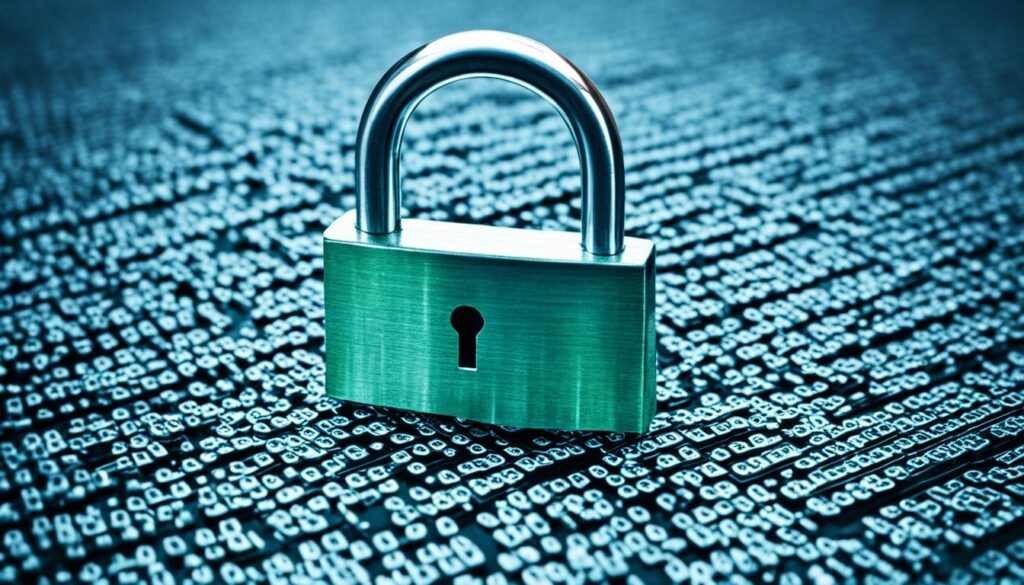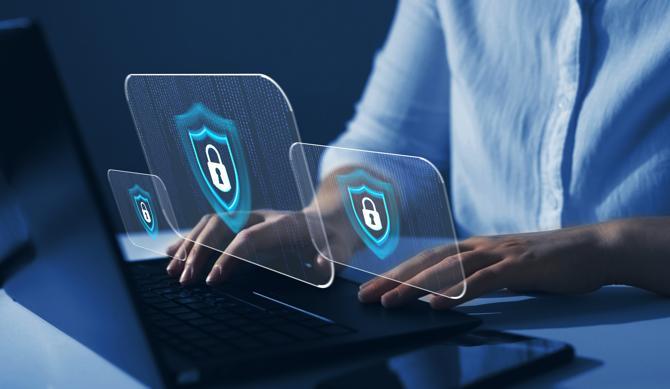Today, the digital world highlights the need for cybersecurity. Businesses now use technology more than ever. Yet, they face serious risks from cyber threats. It’s vital for businesses to protect their data and secure their networks.
Proper cybersecurity measures involve many steps. This includes knowing the dangers, making a solid security plan, and training staff. Companies also need to use safe technology, keep their software updated, and back up their data. Having a good incident response plan is also key.
Key Takeaways
- Cybersecurity is essential for protecting businesses, customers, and assets from cyber threats.
- Understanding the risks, implementing security policies, and training employees are crucial for effective cybersecurity.
- Secure technology, software updates, and data backup are essential for preventing security breaches and ensuring business continuity.
- Effective incident response planning can help organizations mitigate the impact of cyber attacks and security breaches.
- Investing in cybersecurity is a critical component of risk management and cyber resilience for modern businesses.
Understanding Cybersecurity
Cybersecurity protects devices and services from harmful attacks. These attacks come from hackers, spammers, and cybercriminals. It includes using different technologies, processes, and methods to keep our systems and data safe.
There are many parts to cybersecurity. This includes looking after data, network, and cloud security. It also involves teaching people how to be safe online.
The Scale of Cyber Threats
Forbes says that 2022 will bring new and scary cybersecurity challenges. Things like supply chain issues and more risks with smart devices. There’s also a lack of people with the right cyber skills.
By 2025, cybercrime could cost $10.5 trillion every year. These costs are going up fast. The pandemic, increased use of cryptocurrency, and more remote work have given cybercriminals more chances to attack.
Types of Cyber Threats
Cyber threats include many things like malware, phishing, and denial-of-service attacks. These can lead to data theft and system damage. Now, cybercriminals are smarter and can often beat old security methods.
Why is Cybersecurity Important?
Cybersecurity is vital as it keeps our data safe from theft and harm. This includes info like our names, health details, company secrets, and more. Without strong protections, businesses become easy targets for thieves online.
The absence of cybersecurity can lead to various problems. These range from losing money and damaging a company’s name to legal issues and work stoppages. Because of this, maintaining customer trust, protecting important data, and keeping a business running are critical.

The Consequences of Cyber Attacks
Financial Losses
Cyber attacks impact businesses big and small. They cause huge financial losses and hit reputation damage. Also, they bring about legal and regulatory consequences. Plus, they lead to operational disruption.
Reputation Damage
The Ponemon Institute’s report said the US SMBs’ average data breach cost in 2020 was $3.86 million. Moreover, global cybercrime costs are expected to skyrocket by 2025. This increase will reach $10.5 trillion annually. These financial impacts include data breaches, paying ransoms, and recovery costs.
Legal and Regulatory Consequences
Data breaches dent an SMB’s reputation heavily. This can make customers not trust the company anymore. A survey showed that half of consumers would leave a company after their personal data was compromised. It’s key for companies to protect data to keep customer trust and brand reputation.
Operational Disruption
Not meeting cybersecurity compliance requirements can lead to legal penalties. There are strict data protection laws and regulations worldwide. For example, GDPR in Europe or HIPAA in the US. SMBs hit by data breaches could face serious fines for non-compliance.
Protecting Your Business from Cyber Threats
Cyber attacks like ransomware can halt a business’s key operations. Things like DDoS attacks can stop services and cause money loss. SMBs are in a risky position as they might not have top-notch cybersecurity measures. Protecting against these threats is crucial for operational continuity.
Cybersecurity Policy and Training
Setting up a strong cybersecurity policy for your business is key. It should explain rules and steps for security, including how to set strong passwords. It also needs to cover backing up important data, how to check for problems, and what to do if there’s a security breach. Teach your team about the best ways to stay safe online. This includes knowing what to look out for, like fake emails that try to trick you into sharing personal info.
Secure Technology and Software Updates
Using tools like firewalls, antivirus software, and extra login checks really helps. These tools can shield your information from people who shouldn’t see it. Make sure all your tech is updated, as new updates often include better protection. Old tech is more likely to be attacked.
Data Backup and Recovery
Don’t forget to regularly save a copy of all your information. This is crucial just in case there’s a big problem like a cyber attack. Having a plan to quickly get everything back in order can save a lot of stress and money. Make sure you can quickly get your systems running smoothly again after a cyber hit.
Incident Response Planning
It’s smart to have a detailed incident response plan ready. This plan should list what to do if your business is under attack. It should include steps to isolate the issue, contact the right people, and get everything back to normal. A good plan helps you recover faster and cut down on the bad effects of the attack.
The Importance of CyberSecurity
Cybersecurity is vital for keeping sensitive data safe. This includes personal info (PII), health data (PHI), and ideas. Using strong data protection tools like encryption keeps data secure. With the right controls, we can stop outsiders from getting in. This helps keep info safe, whole, and available whenever needed.
Safeguarding Sensitive Data
Keeping information security and privacy in mind guards what’s important against online dangers. Regular updates and employee training are key to dodging data breaches. These steps are critical for staying one step ahead of cyber threats.
Preventing Data Breaches
Good cybersecurity means less risk from cyber attacks. Managing vulnerabilities and layering defenses can make a big difference. It’s a way to protect valuable data and avoid costly breaches.
Maintaining Customer Trust
Strong cybersecurity operations are essential for earning and keeping customer trust. A focus on data privacy shows you care. This leads to more loyalty and a better spot in the market.
Challenges in Cybersecurity
Today, the world is facing a rapid change in cyber threats. With the growth of the Internet of Things, there are more devices connected. This gives cybercriminals more chances to attack. Organizations must find and fix these weak spots.
Evolving Cyber Threats
Cybercriminals change their methods to find new ways to attack. Things like the recent pandemic, the rise of cryptocurrency, and remote working have given them more chances. It’s hard for organizations to keep up and protect against these new dangers.
Vulnerability of Connected Devices
Connected devices have greatly increased the ways cybercriminals can strike. Many of these devices have weak security and old software. This makes them easy targets. Ensuring these devices are safe is a big task for organizations.
Cybersecurity Skills Shortage
There aren’t enough people with cybersecurity skills to meet the demand. This gap makes it hard for organizations to defend against cyber threats. Solving this issue with more training is crucial for better security.

Cybersecurity Best Practices
To keep safe from cyber attacks, it’s important to have a employee cybersecurity awareness. Teaching workers about risks like social engineering and phishing helps them spot and deal with dodgy activities. This cuts down on successful attacks.
Using strong cybersecurity controls like access management and encryption is also key. With these tools, organizations can guard their systems and info against many online dangers. It’s vital to check and update security measures to stay ahead of threats.
Regular cybersecurity risk assessments are a must. They involve things like vulnerability scanning and threat modeling. This proactive step helps find and fix weak spots before attackers can strike, making a business’s security better.
The Future of Cybersecurity
Technology is always advancing. Because of this, cybersecurity must meet new challenges. Quantum computing and the Internet of Things (IoT) have their own security risks. The future of cybersecurity will focus on preparing for these new threats.
Emerging Technologies and Threats
Quantum computing might outsmart our current ways of keeping data safe. We need new security methods that even quantum computers can’t crack. The IoT also brings more devices that hackers can target. It’s important to find ways to keep these devices and the networks they’re on safe.
The Role of Artificial Intelligence
Artificial intelligence and machine learning will become key. They will help make cybersecurity faster and stronger. Through them, we can better spot and stop threats. Using AI in security will help stay safe from complex attacks.
Enhancing Cyber Resilience
Being ready for attacks is vital. This means having a solid plan for when things go wrong. It involves making security better, having a strong plan for continuing business, and getting all workers to care about staying safe online.
FAQ
What is the definition of cybersecurity?
Cybersecurity protects internet-connected devices from attacks by online criminals.
It uses technology, processes, and methods to keep computer systems safe from harm.
What are the types of cyber threats?
Cyber threats include cyberterrorism, malware, and phishing. They aim to steal data, disrupt systems, and cause chaos.
These dangers can come in many forms, like viruses, worms, and denial-of-service attacks.
Why is cybersecurity important?
It’s crucial for keeping all data safe, from personal info to government secrets. Without it, organizations face the risk of being attacked by cybercriminals.
This can lead to data breaches, financial loss, and harm to a company’s reputation.
What are the consequences of cyber attacks?
Cyber attacks can cause big financial losses and hurt a company’s image. They can also result in legal trouble and fines.
If data isn’t protected well, a business may suffer a lot. It may face customer mistrust and operational issues.
What are some best practices for protecting a business from cyber threats?
Setting up strong cybersecurity policies is essential. So is training staff, keeping systems updated, and backing up data frequently.
Having a plan to respond to incidents is also important. These steps can make a business much safer online.
How can cybersecurity help safeguard sensitive data and maintain customer trust?
By using tools like encryption and access controls, cybersecurity prevents data theft. It keeps essential information safe, shows customers their data is secure, and boosts loyalty.
Being proactive about protecting data helps build trust and keeps a company competitive.
What are the challenges in the cybersecurity landscape?
Staying ahead in cybersecurity is hard. Threats change quickly, and there’s a lack of skilled workers. Cybercriminals are always finding new ways to attack.
With many devices connected to the internet, it’s harder to defend a business from these threats.
What are some cybersecurity best practices for businesses?
Teaching employees about cyber risks and maintaining strong security is a must. So is regularly assessing risks and keeping up with new threats and technology.
AI-based security tools and a solid cyber resilience strategy can significantly improve a company’s safety.



